|
|
|
Sort Order |
|
|
|
Items / Page
|
|
|
|
|
|
|
| Srl | Item |
| 1 |
ID:
174450
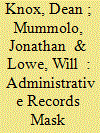

|
|
|
|
|
| Summary/Abstract |
Researchers often lack the necessary data to credibly estimate racial discrimination in policing. In particular, police administrative records lack information on civilians police observe but do not investigate. In this article, we show that if police racially discriminate when choosing whom to investigate, analyses using administrative records to estimate racial discrimination in police behavior are statistically biased, and many quantities of interest are unidentified—even among investigated individuals—absent strong and untestable assumptions. Using principal stratification in a causal mediation framework, we derive the exact form of the statistical bias that results from traditional estimation. We develop a bias-correction procedure and nonparametric sharp bounds for race effects, replicate published findings, and show the traditional estimator can severely underestimate levels of racially biased policing or mask discrimination entirely. We conclude by outlining a general and feasible design for future studies that is robust to this inferential snare.
|
|
|
|
|
|
|
|
|
|
|
|
|
|
|
|
| 2 |
ID:
157415
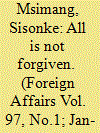

|
|
|
|
|
| Summary/Abstract |
In old black-and-white photographs, the antiapartheid activist Ahmed Timol looks elegant, with an open face and a ready smile. One classic shot captures him midstride. Clad in dark sunglasses with a pipe dangling from his mouth, he has the dashing air of a 1950s film star. Shortly after that photo was taken, on October 25, 1971, Timol—a member of the South African Communist Party—was arrested. Two days later, he was dead. His body was found on the pavement outside the headquarters of the notorious Security Branch of the apartheid police in Johannesburg. An inquest overseen by an apartheid judge determined that Timol had committed suicide by jumping from a window. He was not yet 30.
|
|
|
|
|
|
|
|
|
|
|
|
|
|
|
|
| 3 |
ID:
093392
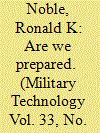

|
|
|
| 4 |
ID:
104429
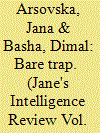

|
|
|
| 5 |
ID:
107619
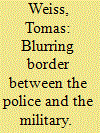

|
|
|
|
|
| Publication |
2011.
|
| Summary/Abstract |
This review article reviews the current 'state of the art' and literature on the role of the police and military within the changing nature of internal and external security. Some scholars believe that the border between these two forces has recently begun to blur, whereas others strongly disagree. This article argues that the current debate lacks comprehensiveness and conceptual underpinning. It is suggested that definitional differences between the two forces should serve as the basis for detailed and comprehensive future case studies.
|
|
|
|
|
|
|
|
|
|
|
|
|
|
|
|
| 6 |
ID:
075667
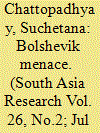

|
|
|
|
|
| Publication |
2006.
|
| Summary/Abstract |
This article examines the impact of the anti-Bolshevik surveillance network created by the colonial state on the urban political milieu of Calcutta during the late 1910s and the early 1920s. The first socialists in Calcutta (1921-24), predominantly Muslims, emerged from the ranks of urban intellectuals and political activists. The article argues that the state's insistence on labelling various social and political segments, including early socialists, as political tools of Moscow demonstrated its inability to grasp the local responses to an international current. It is shown that despite enforcement of various strategies, which tried to anticipate and prevent the spread of socialism, the colonial state failed to counter the emergence of the left in the city.
|
|
|
|
|
|
|
|
|
|
|
|
|
|
|
|
| 7 |
ID:
130785
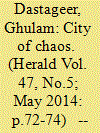

|
|
|
| 8 |
ID:
190928
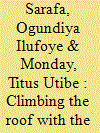

|
|
|
|
|
| Summary/Abstract |
The paper qualitatively examines the role of community policing as a panacea to insecurity in Nigeria through documentary sources. It is argued that the social and political environment in Nigeria is pervaded by the Boko Haram uprising in the North East zone, banditry and cattle rustling in the North West and North Central zones, ethnic militia in the South South and South East zones and armed robbery and ritual killings in the South West zone. Nigeria has become one of the most unsafe places to live in the world, the rate of killings suggesting that the Nigeria Police Force (NPF) – an organisation created for ensuring internal peace and cohesion – has failed in its statutory responsibilities. It is concluded that community policing which ensures the collaboration of citizens with security agents is the right approach to alleviating the internal security crisis in Nigeria.
|
|
|
|
|
|
|
|
|
|
|
|
|
|
|
|
| 9 |
ID:
190877
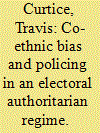

|
|
|
|
|
| Summary/Abstract |
Why do people cooperate with police in multi-ethnic societies? For scholars of comparative politics and international relations, examining the effects of ethnicity on patterns of conflict, cooperation, and state repression remains a foundational endeavor. Studies show individuals who share ethnicity are more likely to cooperate to provide public goods. Yet we do not know whether co-ethnic cooperation extends to the provision of law and order and, if so, why people might cooperate more with co-ethnic police officers. In the context of policing, I theorize co-ethnic bias affects interactions between people and the police because individuals prefer officers who share their ethnicity and fear repression more when encountering non-co-ethnic officers. Using a conjoint experiment in Uganda, I demonstrate that individuals prefer reporting crimes to co-ethnic officers, even after controlling for potential confounders. Broadly, this result is strongest among individuals with no trust in the police, the courts, or the political authorities. These findings have important implications for the politics of policing, conflict, and social order.
|
|
|
|
|
|
|
|
|
|
|
|
|
|
|
|
| 10 |
ID:
090045
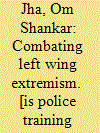

|
|
|
|
|
| Publication |
New Delhi, IDSA, 2009.
|
| Description |
38p.
|
| Series |
IDSA occasional paper no. 3 June 2009
|
| Standard Number |
9788601957X
|
|
|
|
|
|
|
|
|
|
|
|
Copies: C:2/I:0,R:0,Q:0
Circulation
| Accession# | Call# | Current Location | Status | Policy | Location |
| 054351 | 363.20/JHA 054351 | Main | On Shelf | General | |
| 054352 | 363.20/JHA 054352 | Main | On Shelf | General | |
|
|
|
|
| 11 |
ID:
182652
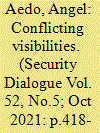

|
|
|
|
|
| Summary/Abstract |
The inhabitants of the squatted settlements in the border city of Arica, mostly indigenous migrants from the Peruvian–Bolivian highlands, feel the effects of the racialized geography of northern Chile through social discrimination, economic exploitation and deprivation of political rights. In these settlements, their migrant residents make palpable the pervasive tension between a mode of visibility that I analyse in terms of a ‘politics of presence’ and another kind of visibility that is created by the state’s ‘legibility’ techniques. Three aspects come together in this process of conflicting visibilities: (1) the reciprocal influence between a borderland and its police order; (2) the relationship between biopower and the (in)visibility dynamic of migrant lives; and (3) the generative relationship between a redefinition of security and altered citizen practices. Through an analysis of these sets of relationships, the article provides a richer understanding of how, in the struggle between the political logic of equality and the police logic of domination, border migrants forge cunning and rebellious political subjectivities that challenge the border regime in which they find themselves by questioning both the basis on which rights are defined and the boundaries of citizenship.
|
|
|
|
|
|
|
|
|
|
|
|
|
|
|
|
| 12 |
ID:
184074
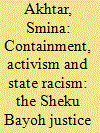

|
|
|
|
|
| Summary/Abstract |
This article develops a framework to think sociologically about the containment of activism in contexts of state racism. It argues that normal everyday practices of the police and judicial system have mechanisms which contain challenges to their authority. It shows how state racism is embedded within the criminalisation of black people and enacted through policing. The analysis focuses on Scotland’s first black death in police custody and the campaign formed by his family to establish the circumstances of the death. Sheku Bayoh died shortly after being arrested and restrained by up to nine police officers in Kirkcaldy, a small town on the east coast of Scotland, in May 2015. I pay attention to the role played by racism in the media’s framing of Sheku’s death, common in explaining deaths of black people at the hands of the police.
|
|
|
|
|
|
|
|
|
|
|
|
|
|
|
|
| 13 |
ID:
143174
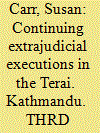

|
|
|
|
|
| Publication |
kathmandu, THRD Alliance, 2014.
|
| Description |
138p.pbk
|
|
|
|
|
|
|
|
|
|
|
|
Copies: C:1/I:0,R:0,Q:0
Circulation
| Accession# | Call# | Current Location | Status | Policy | Location |
| 058447 | 323.4/CAR 058447 | Main | On Shelf | General | |
|
|
|
|
| 14 |
ID:
123226


|
|
|
|
|
| Publication |
2013.
|
| Summary/Abstract |
The Kingdom of Hungary had to face a post-war clutter in 1918-1919. Each center of power tried to establish a kind of armed forces and police in this period. For a long time, Hungary did not have a general staff. Therefore, the Ministry of Defense had an office which worked like general staff, severely 'sub rosa'. Officially the Hungarian General Staff and the branch for intelligence and/or counterintelligence were established in 1938. It had good relationship with its German counterpart and included the Hungarian entity for political investigations. The officials knew which German officer had a Hungarian "connection" and who this person was. It is only a historical quaintness that soldiers or Reichssicherheitshauptamt (Reich Security Main Office [RSHA]) officers and Hungarian police officers joined Office of Strategic Services (OSS) after World War II.
|
|
|
|
|
|
|
|
|
|
|
|
|
|
|
|
| 15 |
ID:
115211
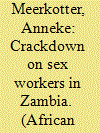

|
|
|
|
|
| Publication |
2012.
|
| Summary/Abstract |
In May 2012, Zambia's Inspector-General of Police announced a crackdown on sex workers. This commentary discusses the rationale behind this proposed crackdown and the problems associated with such a policy response.
|
|
|
|
|
|
|
|
|
|
|
|
|
|
|
|
| 16 |
ID:
077340
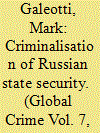

|
|
|
|
|
| Publication |
2006.
|
| Summary/Abstract |
While the Russian authorities may seek to talk up the role their security apparatus plays in combating organised crime, in fact, they are to a large extent falling prey to criminalisation. A culture of corruption and a decade of neglect have combined to create a situation in which not only do police, army, and security officers provide services to 'civilian' criminals but organised crime groupings have actually formed within them. These gangs tend to be defined by their location and legal powers, both of which can be abused for criminal ends, and they include police and military officers at the very apex of their respective command structures. There are grounds for hope now that President Putin is beginning to become aware of the practical dangers this poses for Russian national security, not least given the haemorrhage of weapons to criminal and insurgent hands, but, for the immediate future, the security apparatus will remain corrupted and criminalised.
|
|
|
|
|
|
|
|
|
|
|
|
|
|
|
|
| 17 |
ID:
065137
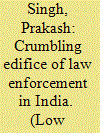

|
|
|
| 18 |
ID:
122637
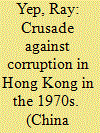

|
|
|
|
|
| Publication |
2013.
|
| Summary/Abstract |
The creation of the Independent Commission Against Corruption (ICAC) in February 1974 was arguably one of the most important developments in Hong Kong since 1945. Not only did major corruption syndicates disappear from the fabric of public administration in the colony, but the popular acceptance of bribery as a component of social life also faded away. Sir Murray MacLehose, who served as Governor of Hong Kong between 1971 and 1982, was regarded by locals as the maverick behind this miracle. This article argues, however, that the genesis of the ICAC could be better understood as a product of the cumulative efforts of MacLehose and his predecessors. The initiative should also be considered in the political context of the rising tension between London and the local community. In a way, the establishment of the ICAC helped pre-empt London's intervention in this matter. Also, despite a public appearance of unbridled support for the crusade against corruption, MacLehose's resolve was severely tested during the early years of the ICAC, and he did contemplate moderating the operation of the Commission, even before the partial amnesty in 1977.
|
|
|
|
|
|
|
|
|
|
|
|
|
|
|
|
| 19 |
ID:
169243
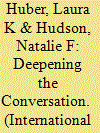

|
|
|
|
|
| Summary/Abstract |
Scholarship on international police reform and Women, Peace and Security (WPS) has flourished in the last decade and the potential for engagement across these two bodies of literature is promising. Given the increased use of police personnel in international peace missions and emphasis on gender mainstreaming policies, the need for assessing the impact of these two trends has never been greater. Thus, this paper seeks to bridge gaps between the mainstream policing scholarship and feminist scholars focused on post-conflict peacebuilding police reforms. We explore how feminist scholars can engage with policing literature’s technocratic language and ‘in the field’ experience as well as how policing scholars can interact with feminist scholars to transform traditional approaches to security in the context of the WPS Agenda. We demonstrate the benefits of increased dialogue and interaction by highlighting the common and diverging challenges in both fields in three areas: the design, implementation, and evaluation. Finally, to illustrate the dynamic intersection of these areas of study and practice, we examine the transnational policing efforts to gender mainstream the Liberian National Police (LNP) in the context of the UN Mission in Liberia (UNMIL).
|
|
|
|
|
|
|
|
|
|
|
|
|
|
|
|
| 20 |
ID:
066923
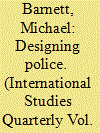

|
|
|
|
|
|
|
|